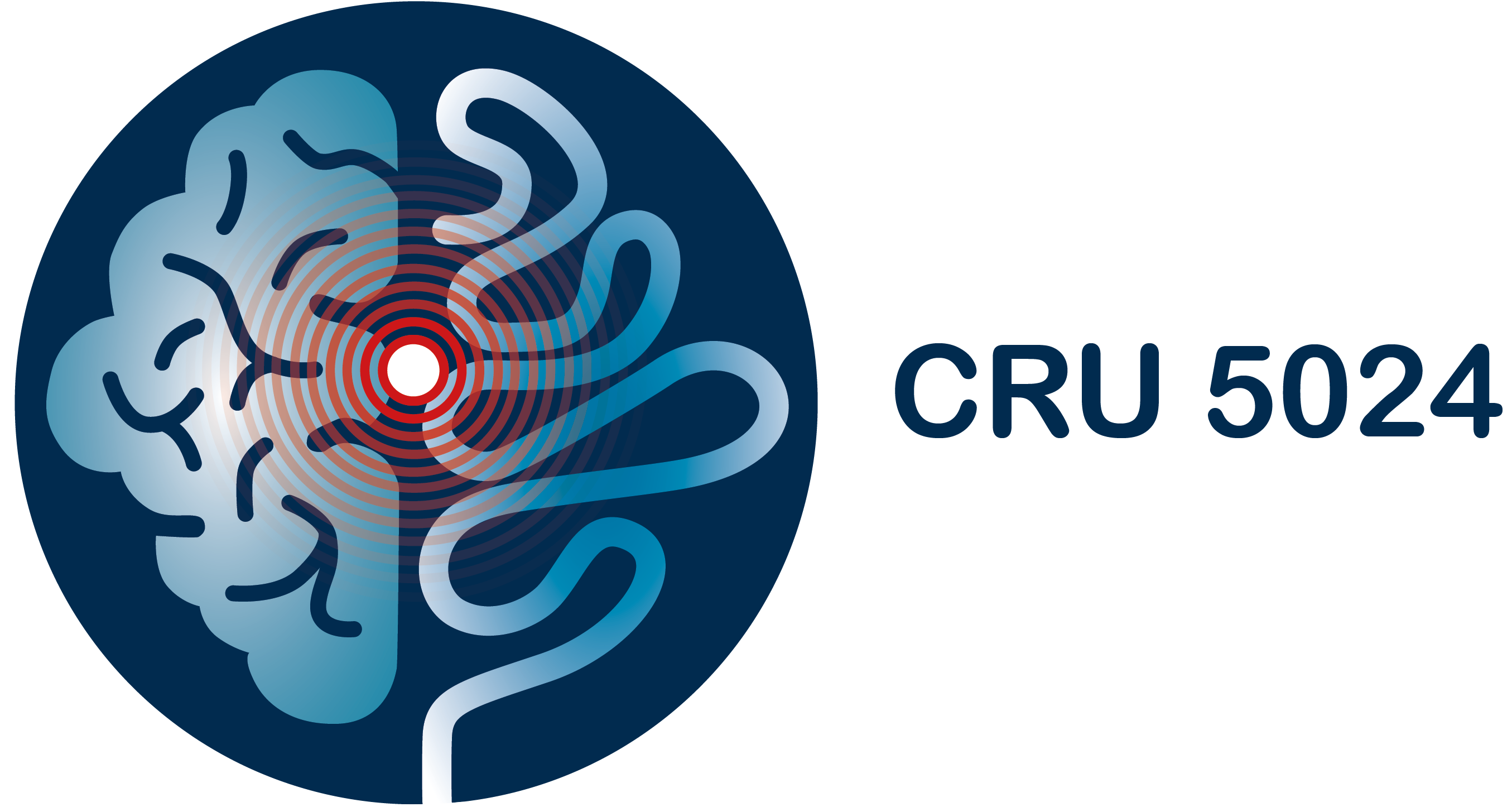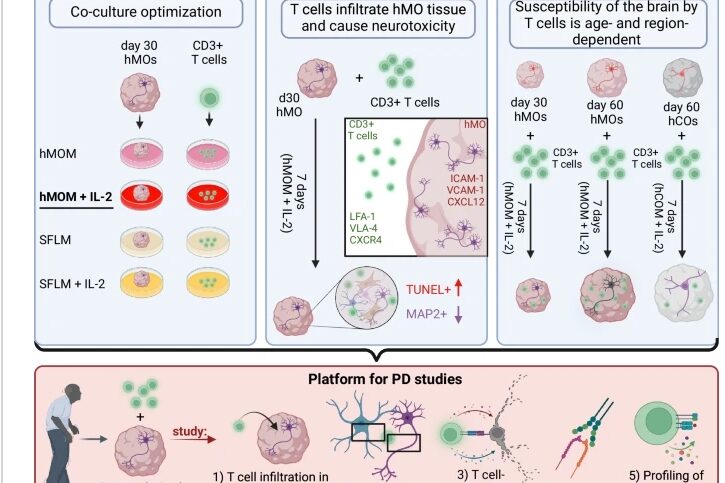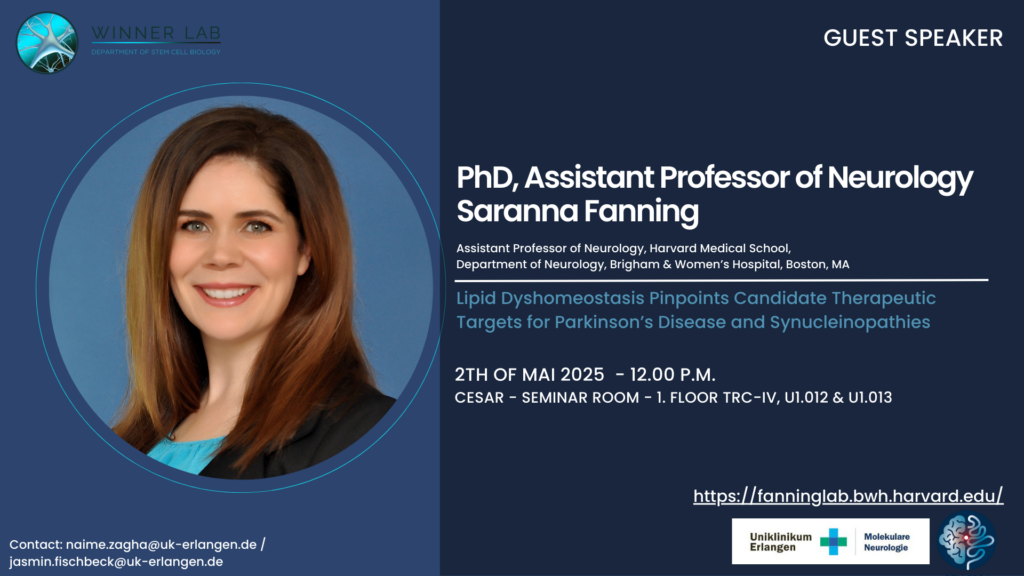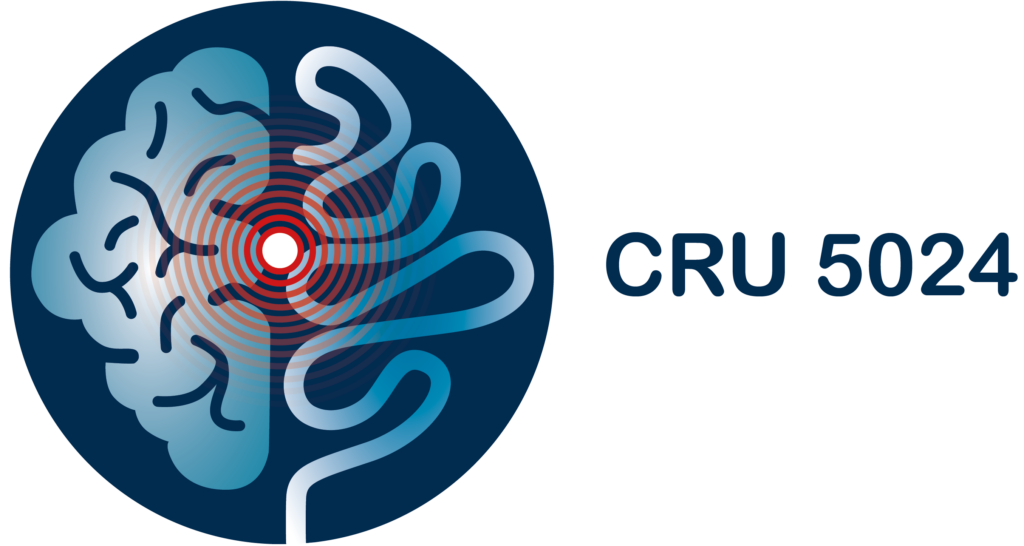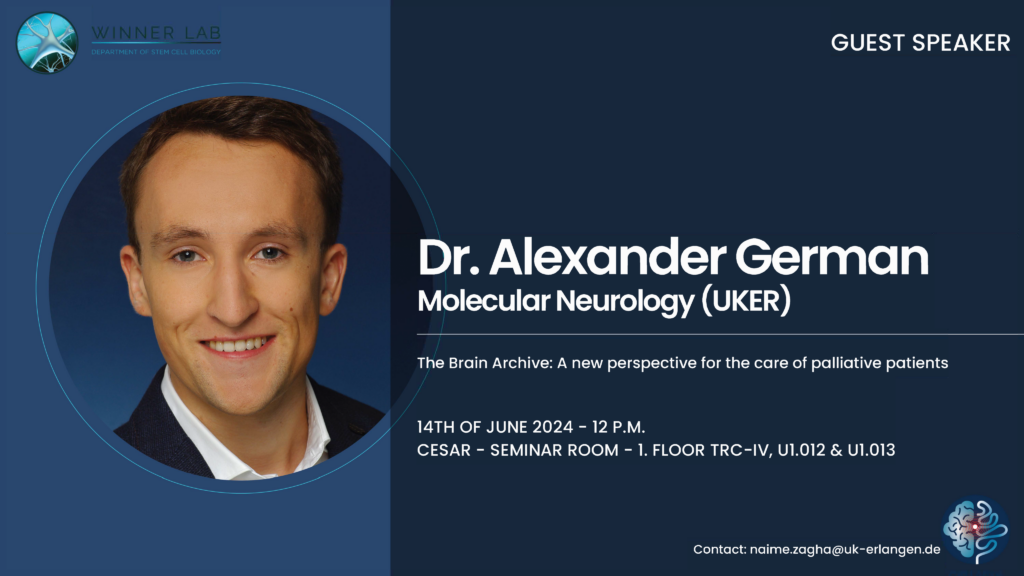GB.Com
About GB.Com Projects Public Events Lectures & Seminars Meetings Press
Top News
StudentHighlights
Elizaveta Gerasimova was awarded with the Top 15 Digital Oral Presentation Award at the ECCO25 congress in Berlin, Germany. The presentation was titled DOP068: Vedolizumab counteracts Parkinson’s disease-related brain pathology driven by gut-primed IBD T cells, you can also find out more about Eliza...
Publications
Great work form Elizaveta Gerasimova on a novel co-culture model of T cells and midbrain organoids.
Congratulations, dear Elizaveta!
MemberHighlight ✨
Prof. Beate Winner, one of the lead scientist for the GB.com consortium participated in Palacios' podcast hosted by Gabriel Palacios.
The podcast highlight the gut-brain axis concept and its importance. You can listen to it on Youtube 🔴 (https://lnkd.in/euvXySKK) or Spotify 🟢(https://lnkd.in/ezqQKA...
Research, Family, Support: Making It Work
Our clinical research group benefits greatly from the DFG’s equal opportunity support, which helps us combine professional responsibilities with family life.
It’s not just our doctoral researchers who benefit – our leadership team does too.
This short video offers a glimpse into how our spokespers...
„Kleine Schritte“ – Ein bewegender Auftakt in Erlangen
An zwei Tagen durften wir im E-Werk Erlangen gemeinsam mit dem Schlosstheater Thurnau das Stück „Kleine Schritte“ präsentieren – der Auftakt ihrer Tour durch Deutschland und Österreich. Das Stück macht Mut für ein Leben mit Parkinson und bewegte das Publikum tief.
In der anschließenden Podiumsdis...
Seminars & Lectures
First iRTG meeting
On October 23, 2024, we held our iRTG meeting, which was attended by our doctoral candidates and MD students. The day kicked off with a bioinformatics course focusing on the analysis of their own RNA-seq data and optimizing visualizations for publication readiness. This was followed by Science Slam-style presentations from several members, offering everyone a chance to gain insight into the possibilities of science communication.
Start of GB.Com Lecture Series 2025
We are thrilled to invite you to the GB.Com Lecture Series 2025! Join us each month as one of our project leaders shares cutting-edge research on the Gut-Brain Axis, fostering connections in this exciting field.
Seminars, Lectures & Meetings
People
StudentHighlights
Elizaveta Gerasimova was awarded with the Top 15 Digital Oral Presentation Award at the ECCO25 congress in Berlin, Germany. The presentation was titled DOP068: Vedolizumab counteracts Parkinson’s disease-related brain pathology driven by gut-primed IBD T cells, you can also find out more about Eliza...
MemberHighlight ✨
Prof. Beate Winner, one of the lead scientist for the GB.com consortium participated in Palacios' podcast hosted by Gabriel Palacios.
The podcast highlight the gut-brain axis concept and its importance. You can listen to it on Youtube 🔴 (https://lnkd.in/euvXySKK) or Spotify 🟢(https://lnkd.in/ezqQKA...
Research, Family, Support: Making It Work
Our clinical research group benefits greatly from the DFG’s equal opportunity support, which helps us combine professional responsibilities with family life.
It’s not just our doctoral researchers who benefit – our leadership team does too.
This short video offers a glimpse into how our spokespers...
Welcome our new student representatives Bruno & Luis
We are delighted to welcome our new student representatives, Bruno Ghirotto and Luis Goncalves, to the GB.Com consortium! As student representatives, they will serve as the voice of our doctoral candidates, fostering communication with the PIs and the steering committee. They will also work to incor...
Congratulations to Patrick Süß on his Else Kröner Fellowship!
We congratulate Patrick Süß on receiving the Else Kröner Memorial Fellowship for his research on the connection between intestinal inflammation and Parkinson's disease.
Recent studies suggest that inflammation in the gut can contribute to the development of Parkinson's by spreading to the brain. ...
Congratulations to our speaker Beate Winner on her W3 professorship!
We are pleased to announce that the speaker of our Clinical Research Unit (KFO) has been promoted to a W3 professorship at #FAU's Medical Faculty. This promotion recognizes her exceptional contributions to research and leadership in the field. We congratulate her on this significant achievement and ...
Events
Best of Science Slam 2024
At the Science Slam in September 2024 in Erlangen, we welcomed around 150 guests eager to learn more about our research. Our slammers delivered outstanding performances, making the event a great success! Here’s a "Best of Science Slam" video and some impressions in the galerie below.
Theaterstück “Kleine Schritte” in Erlangen
Theaterstück "Kleine Schritte" in Erlangen 04.02.2025 und 05.02.2025 ab 18:30 Uhr In Zusammenarbeit mit dem Sonderforschungsverbund EmpkinS (FAU) präsentieren wir am 4. und 5. Februar 2025 ein bewegendes und lebensbejahendes Theaterstück im Erlanger E-Werk. Das Stück, das in Kooperation ...
Networking Conference with the Alexander von Humboldt Foundation
Networking Conference with the Alexander von Humboldt Foundation
On 21 November 2024, we are excited to host a networking conference in collaboration with the Alexander von Humboldt Foundation. Researchers from various fields within the life sciences and from different parts of the world will prese...
Scientist are grapping the Mic – Join our Science Slam in Erlangen
After the great success of our 2021 Science Slam (Best of Science Slam Video), where we thrilled over 500 attendees with our research on stem cells and gut-brain cross-talk, we’re back with another thrilling event!
Beate Winner erörtert die Geheimnisse der Hirn-Darm-Achse
Vor über 150 interessierten Bürgerinnen und Bürgern hielt Prof. Beate Winner, Sprecherin der KFO524, einen spannenden Vortrag über die Geheimnisse der Hirn-Darm-Achse und die Rolle der Stammzellforschung im Dienste der Gesundheit im Rahmen der Bürgervorlesung des Uniklinikum Erlangens.
Ein voller Erfolg – der GirlsDay mit GB.Com
Wir freuen uns über den gelungenen Girls' Day, an dem 21 Schülerinnen einen Tag lang in die Welt der Forschung eintauchen durften.
Der Tag begann mit inspirierenden Vorträgen von Prof. Winner und Prof. Günther, die jeweils ihren persönlichen Karriereweg aufzeigten und betonten, wie wichtig es ist, ...
Press
Prof. Beate Winner and Prof. Jürgen Winkler featured in Süddeutsche Zeitung for World ParkinsonDay
On the occasion of World Parkinson's Day on April 11, 2025, Prof. Beate Winner, spokesperson of KFO5024 - GB.Com, and Prof. Jürgen Winkler, project leader within the research group, were guests of the Süddeutsche Zeitung.
A special feature including the interview was published in the nationwide edi...
Neuroforum on KFO 5024 – A Look at Innovative Neuroscience Research
In the latest issue of Neuroforum, an article was published about our KFO 5024. The article highlights how the latest research findings from KFO 5024 not only enrich the scientific landscape but could also influence the clinical practice of the future.
You can find the article on page 29 of the c...
Exzellent interdisziplinär: Artikel über die KFO5024
In der aktuellen Ausgabe der Zeitschrift ampuls am Uniklinikum Erlangen wird die Klinische Forschungsgruppe KFO 5024 vorgestellt, die mit über sieben Millionen Euro von der Deutschen Forschungsgemeinschaft (DFG) gefördert wird. Unter der Leitung von Prof. Dr. Claudia Günther und Prof. Dr. Beate Winn...
Film über die KFO5024 – Den Geheimnissen der Darm-Hirn Achse auf der Spur
Hinter dem Begriff „Darm-Hirn-Achse“ steckt die Annahme, dass es einen Zusammenhang zwischen neurologischen Erkrankungen und immunologischen Veränderungen im Gastrointestinaltrakt gibt, dass also Darm und Gehirn miteinander kommunizieren – und dass sich Krankheiten beider Systeme gegenseitig beeinfl...
Claudia Günther in der taz
Unser Immunsystem schützt uns vor Krankheiten - das ist bekannt. Forschende entdecken jedoch immer mehr über seine komplexen Prozesse. In diesem Artikel gibt Prof. Claudia Günther Einblicke in ihre Forschung zur Kommunikation zwischen Gehirn, Darm und Immunsystem. Im Interview mit der taz erklärt si...
SZ-Artikel über die KFO5024
Anlässlich des Welt-Parkinson-Tags am 11. April hatten wir die Gelegenheit, in der Süddeutschen Zeitung über unsere Forschungsvorhaben zu informieren und ihre Bedeutung für die Parkinson-Krankheit unter dem Gesichtspunkt der Darm-Hirnachse herauszustellen.
Ein faszinierendes Forschungsgebiet ist ...
Guest Speaker
Guests
